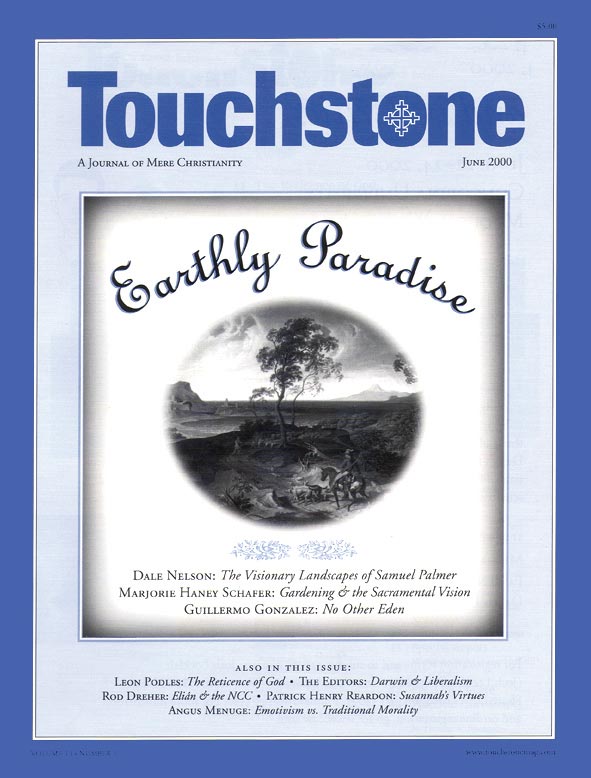Feature
Just Sentiments
Emotivism versus Traditional Morality
by Angus J. L. Menuge
On the railroad trains, all the passengers together were a community, called by a shared moral understanding to sacrifice for each other. But if, as we now seem to think, there are no other passengers, there is no community. . . . The illusion that we travel life alone is ruining us all. The proper name of the illusion is incivility.1
As Aristotle understood it, virtue is what enables one to live well in community. Thus, virtue is foundational to civilization. That virtue and civilization are in a lamentable state ought to be beyond dispute. However, language itself has been corrupted and euphemism is used to mask moral failures as progress.2 Abortion is “reproductive freedom,” and the abdication of parental responsibility for tiny children is an “early opportunity for socialization,” and a means of “empowerment” for adults. How and why has this decline in virtue and civilization happened? What can be done about it? Both C. S. Lewis and Alasdair MacIntyre have diagnosed emotivism as the chief malady and certain kinds of narrative as among the potential cures.
Emotivism
Emotivism “is the doctrine that all evaluative judgments and more specifically all moral judgments are nothing but expressions of preference, . . . of attitude or feeling. . . .”3 This is the view expressed by the authors of the “Green Book” (an English textbook4) criticized by C. S. Lewis at the beginning of The Abolition of Man. According to this book, when Coleridge said that a waterfall was sublime, he only seemed to be talking about the waterfall; in fact, he was talking about his own feelings.5 Though this is an aesthetic rather than an ethical judgment, it suggests the full doctrine of emotivism to the reader, that all value judgments, including ethical ones, can be interpreted as subjective reports of feelings.
As Lewis saw, emotivism trivializes ethical statements, because it provides no standard for determining which preferences or emotions are appropriate. The preferences of the child molester are in principle just as “valid” as those of the protective parent. Emotivism eliminates the central idea of all traditional ethical systems (which Lewis calls the Tao), that “objects did not merely receive, but could merit, our approval or disapproval, our reverence, or our contempt.”6 Traditional ethics asserts that one’s preferences can be wrong, as when Lewis confesses that though he does not personally delight in children, that is a failure in him, because children are, objectively, delightful.7
On the face of it, emotivism is a highly implausible account of the meaning of ethical statements. When we say that murder is wrong, we take ourselves to be saying something true, and if a psychopath denied our claim, we would hold that he was mistaken, not that he was entitled to his preference. Yet emotivism was a quite widely held academic philosophy in the first half of this century, and if MacIntyre is correct, it is the implicit philosophy of many ordinary citizens today. How can this be?
According to MacIntyre, the chief historical reason for the rise of emotivism is to be found in the failure of modernism to provide a rational justification for the objectivity of value statements.8 Modernism is characterized by the view that statements must be able to demonstrate their credentials; appeals to revelation, tradition, or the authority of others are not sufficient to pass muster. If a statement is to be accepted as true, we must have evidence for it, whether from the senses, as empiricists emphasized, or from conceptual reason, as rationalists averred. Coupled with the extraordinary success of experimental science, this outlook reached its sharpest statement in the logical positivism of the late nineteenth and early twentieth centuries.
Logical positivism proposed the new methods of science as the only valid path to knowledge. In its popularization by A. J. Ayer,9 it asserted that statements are literally meaningful only if they are either true by definition (logical truths, like 2 + 2 = 4 or “A bachelor is an unmarried man”) or they are in principle verifiable by observation.10 This criterion created insuperable problems for ethical statements. One cannot deduce the concept of “wrongness” from the concept of “torture,” so it is not true by definition that torture is wrong. At the same time, however sickened one might feel at witnessing torture, it is false that the wrongness of the action is something one perceives with one’s senses or which could be detected by any conceivable scientific instrument. Thus, ethical statements are never literally meaningful, so if they mean anything at all, they must be a disguised, indirect report of something else.
Since ethical judgments are often asserted with considerable emotion, a natural suggestion, made by Ayer, Bertrand Russell, and C. L. Stevenson, was that ethical statements (indeed all value judgments, since they all fail the same test) are really reports of the speaker’s emotion of approval or disapproval. One particularly amusing version of the view came to be known as the “Hurray-Boo” theory of ethics, because it translated “X is right” as “Hurray for X!” and “Y is wrong” as “Boo to Y!” Thus, we end up with emotivism.
Of course, the average person has not heard or consciously agreed with these ideas; but there is reason to think that they have indirectly affected his thinking. Although the specific formulations of logical positivism have long since been rejected by analytic philosophy, the key ideas that ethical statements are problematic, because we lack a scientific procedure for determining their truth value, and that ethical statements are basically about feelings, have been highly influential in educational philosophy. This is because educational philosophy has largely bought into scientism,11 the worldview that animated logical positivism. Scientism claims not merely that science is a method for gaining knowledge, but that it is the only objective method for doing so. It follows from this that while descriptions of nature are objective, evaluative judgments are not, since the former but not the latter are amenable to scientific testing. “Values” therefore cease to be qualities that might objectively characterize actions and become attitudes the subject has towards those actions.
In Lewis’s day, the new class of scientistic educators, typified by the authors of the “Green Book” (whom Lewis dubbed Gaius and Titius), argued that since value statements are merely subjective reports of emotion, they need to be debunked. The goal of education is to raise the student to that level of “scientific” objectivity from which he can see that traditional ethics is really a sentimental fog created by the projection of purely subjective feelings onto a nature devoid of values. Were this view taken seriously, of course, the student is really left in a moral vacuum, since there is no way to claim that one value is better than another. But then, why write a book with the aim of improving the student’s perception of reality? Gaius and Titius certainly think they are contributing to educational and social progress, but that it is progress is a value judgment, and so, if their official account is correct, is merely a disguised expression of their own emotions. As Lewis said,
Their scepticism about values is on the surface; it is for use on other people’s values; about the values current in their own set they are not nearly sceptical enough. . . . A great many of those who ‘debunk’ traditional or (as they would say) ‘sentimental’ values have in the background values of their own which they believe to be immune from the debunking process.12
However, Gaius and Titius provide no rational justification for claiming such immunity, so although they think of themselves as protecting the child from propaganda (irrational persuasion), they cannot show that they have anything better to offer. As Lewis retorts,
The right defense against false sentiments is to inculcate just sentiments. By starving the sensibility of our pupils we only make them easier prey to the propagandist when he comes. For famished nature will be avenged and a hard heart is no infallible protection against a soft head.13
Thus Gaius and Titius cannot evade the need to provide moral education, and the possibility of this enterprise presupposes that values are not purely subjective.
The effect on American education has been significantly different. In America’s schools, pluralism has been used as an excuse to relegate not only religion, but even civic morality into a private realm, despite a 1993 Gallup poll indicating that “90 percent of parents agree that public schools should teach the Golden Rule, moral courage, caring, ethnic tolerance, and honesty.”14 Something called “values” has been discussed, but usually in the context of a “nonjudgmental values clarification,” which presupposes that values are private possessions and that all are equally “valid.”15 Values clarification combined emotivism with the 1960s insistence on “free expression,” but did not explain why it was important to express what it believes to be purely subjective. One teacher felt obliged to explain that it is not wrong for a student to feel it is okay to cheat, even though she would deduct marks if cheating were detected.16 The view expressed is that all values are matters of choice and if any particular value is enforced, it is done so on the basis of power and convenience, not moral authority. No wonder that “almost every student believes, or says he believes, that truth is relative.”17
Matters are not helped by spurious appeals to equality; intelligent criticism cannot be made when students can claim “ I’m as good as you”18 no matter what they think or do. By encouraging a total democracy of values, teachers have abdicated the responsibility of moral education, and “without the development over time of stable character traits, all other moral appeals will fall on deaf ears.”19 The self-esteem movement has made matters worse, since encouraging self-esteem no matter how bad the work or behavior denies “children guidance and concrete rules of behavior, forcing them into a role of authority, as if they were adults.”20
Amazingly, Lewis predicted that most of this would happen; not only that there would be a decline of virtue, but also that educators would look in the wrong place (scientistic attempts at social engineering) to try to solve the problem. Lewis’s diagnosis rests on Plato’s theory of the soul.
In a just man, Plato tells us, the head rules the belly through the chest. That is, the intellect or reason controls the appetites (self-centered desires) with the help of magnanimity, the spirited element. Magnanimity is the seat of those nobler sentiments that transcend the egoistic craving of the belly. It is what enables someone to fight in battle or stand up for the truth or to fulfill his vocation as parent or spouse, even if it means delaying or denying the gratification of the belly. Without magnanimity, there can be no civilization because it alone provides the sense of a common good over and above personal pleasure.
A man without a chest is inevitably a shallow hedonist. His intellect serves only two purposes: determining how to gratify his belly, and rationalizing that choice should it be challenged on moral grounds. Since such gratification often does not contribute to the moral good, the man without a chest must resort to propaganda, manipulating language to make his self-centered behavior appear in a good light. Although the man without a chest has no real virtue, self-interest will make him develop the simulacra of virtue21 necessary to gain the cooperation of others, when it is needed, and to avoid punishment. If caught in wrongdoing, the chestless man may produce an impression of repentance worthy of an Oscar. He will even appeal to the common good and moral principles whenever they happen to coincide with his own interest, quietly dropping them when they do not. Above all, the chestless man is a manipulator, who will say and do whatever is necessary to get what he wants. As Alasdair MacIntyre argues, such men are the mainstay of modern bureaucracies which must mold the behavior of others to suit their own ends without the benefit of moral authority.22
Evidently, emotivism creates men without chests because it destroys magnanimity. If ethics reduces to personal preference, no reason can be given why I should prefer the good of others over my own pleasure, since any such reason would imply that some preferences are better than others. Yet, as MacIntyre points out,23 it is clear that ethical statements do not merely express preferences. Suppose that there is a flood and an ethnic minority family is travelling down a torrent on a picnic table. Jane and John are on the rescue team, and Jane tells John to throw the family a rope. John is a racist and is reluctant to do so; he says, “Why should I?” Suppose Jane answers, “I want you to do it” (an expression of preference). Assuming this came with no implied threat of dismissal in case of noncompliance, John might easily reply, “So what?” Unless someone has the authority to require compliance, we do not take one individual’s preference to be a compelling reason for another person to act. Suppose instead Jane answers, “It is your duty.” Then, as we understand the concept of duty, it is beside the point how John (or Jane) feels about it. If John says, “I’d prefer not to do it” this will be taken as an irrelevant evasion; Jane may fairly reply, “I didn’t ask you what you’d like to do, I told you what you are required to do!” It is perfectly clear that, in the circumstances, “It is your duty to throw the rope” means neither that Jane prefers this (she might be a racist too) nor that John does. Indeed it is rather obvious that ethical statements express obligations that often contradict our preferences (whoever expressed anyone’s preference in saying “I suppose we should go to that faculty meeting”?).
Narrative & Character Formation
We have seen that Lewis argued for the inculcation of just sentiments to develop magnanimity and the virtues that flow from it. Moral psychology has suggested some specific ways in which this can be done. Damon argues that “Bringing to children’s awareness what it is like to be in someone else’s shoes trains a child to be empathetic.”24 This would help recover the sense that other people are “fellow passengers” in life’s journey, and undermine the ethical egoism prevalent in our society.25 Thus, “The task of the modern educator is not to cut down jungles but to irrigate deserts.”26
This might be done by requiring students to visualize the world from another person’s perspective. It can also be achieved through parables, fables, and stories that invite the reader to identify with protagonists in the story.27 The Parable of the Good Samaritan (Luke 10:30–37) calls one to empathize with the robbery victim, to see one’s self-centered neglect for others in the priest and Levite, and to be inspired by the compassion and selflessness of the Good Samaritan. It also highlights the poverty of moral rules without character: the priest and the Levite were experts in the Law, like the man who prompts Jesus’ parable by asking “And who is my neighbor?” hoping to limit his responsibilities. As a student confided to Robert Coles, “I’ve tried to take courses in moral philosophy. . . . But I leave the lecture hall and I can see myself as the same.”28
Stories have a way of getting around the resistance of the heart to direct instruction. Unlike personal confrontation, stories provide enough distance between the author and the reader that the reader does not feel threatened. Yet if the story succeeds, the reader finds himself identifying with the story’s protagonists, and experiencing the moral insights that their successes and failures represent. Recall how Nathan awakens David’s moral sensibility by telling an unsuspected parable of David’s sins of adultery and murder, before announcing that David is “the man” in the parable (2 Sam. 12:1–7). Lewis saw the key to the power of story in its mythic quality, the myth being a point of contact between the abstract and the concrete. In reading a myth, “[y]ou were not knowing but tasting; but what you were tasting turns out to be a universal principle.”29 In reading the Parable of the Prodigal Son, one tastes folly, dissolution, loneliness, repentance, and forgiveness, yet what one tastes are universal facts about temptation and recovery.
It is because of this “universal in the particular” dimension of stories, that MacIntyre is right to argue that stories—ostensibly about other people and other circumstances—can help to define the reader’s own role in society, supplying a vocabulary of appropriate actions and responsibilities. For
man is in his actions and practice, as well as in his fictions, essentially a story-telling animal. . . . It is through hearing stories about wicked stepmothers, lost children, good but misguided kings, wolves that suckle twin boys, youngest sons who receive no inheritance but must make their own way in the world . . . that children learn . . . both what a child or parent is, and what the cast of characters may be in the drama into which they have been born. . . . Deprive children of stories and you leave them unscripted, anxious stutterers in their actions as in their words.30
Stories do not merely tell us about virtue; like a benign infection they become a part of our organism, shaping and defining who we are, and how we look at and feel about the world. They help us to develop magnanimity because they draw us beyond our egotistical desires to see how we should play our role in society. Every hero communicates the message “Go and do likewise”; every villain provides a limit to what one can willingly allow oneself to become. Stories will be even more powerful if they are seen as echoes of the Great Story, with Jesus as the ultimate hero and victor over evil who also graciously forgives our failings and enables our own halting approximation to heroism. This is precisely what Lewis himself hoped to achieve in his Chronicles of Narnia.
Evading the issue of character formation is a disastrous mistake. Civilization is not inevitable but fragile, a tapestry woven together with inspiring stories of virtue. Each one should see his calling as a strand in that tapestry, where it can magnify his talents and better serve the whole. For “He who sets to work on a different strand destroys the whole fabric.”31 The integrity of the fabric and the integrity of the strand are interdependent. •
Notes:
1. Stephen Carter, Civility: Manners, Morals and the Etiquette of Democracy
(New York: Basic Books, 1998), p. 8.
2. An excellent study of this problem is David Mills’s “To See
Truly Through a Glass Darkly: C. S. Lewis, George Orwell, and the Corruption
of Language,” in The Pilgrim’s Guide: C. S. Lewis and the
Art of Witness, ed. David Mills (Grand Rapids, Michigan: Eerdmans, 1998),
pp. 111–132.
3. Alasdair MacIntyre, After Virtue: A Study in Moral Theory, 2nd
ed. (Notre Dame, Indiana: University of Notre Dame Press, 1984), pp. 11–12.
4. According to Walter Hooper, the book is The Control of Language by
Alex King and Martin Ketley. See Walter Hooper, C. S. Lewis: A Companion
and Guide (London: HarperCollins Publishers, 1996), p. 332.
5. C. S. Lewis, The Abolition of Man (New York: Macmillan, 1955),
p. 14.
6. Ibid., p. 25.
7. Ibid., p. 29.
8. See especially MacIntyre, “Why the Enlightenment Project of Justifying
Morality Had to Fail,” ch. 5 in After Virtue.
9. A. J. Ayer, Language, Truth and Logic, 2nd ed. (New York:
Dover, 1952). Ayer, whom Lewis knew, is among the chief targets of The Abolition
of Man.
10. It escaped Ayer that his own statement of this philosophy was therefore
literally meaningless, since it is neither true by definition, nor the sort
of thing one can observe evidence for.
11. According to Peters’s fine study, scientism is the “unique
combination of atheism, materialist philosophy, evolutionism, hostility to religion,
and doctrinaire adherence to the universal validity of the scientific method.”
See Thomas C. Peters, “The War of the Worldviews: H. G. Wells and
Scientism versus C. S. Lewis and Christianity,” in The Pilgrim’s
Guide: C. S. Lewis and the Art of Witness, p. 206. See also Michael
D. Aeschliman, The Restitution of Man: C. S. Lewis and the Case Against
Scientism, reissued with new Foreword and Afterword (Grand Rapids, Michigan:
Eerdmans, 1998).
12. Lewis, The Abolition of Man, p. 41. The same fallacy can be perceived,
with nauseating regularity, in the thinking of contemporary “progressives”
in education; whether “modernist” or “postmodernist,”
the logical error is the same.
13. Lewis, The Abolition of Man, p. 24.
14. Michael and Diane Medved, Saving Childhood: Protecting Our Children
from the National Assault on Innocence (New York: HarperCollins, 1998),
p. 104.
15. Happily, values clarification is on the way out. It remains to be seen
whether “character education,” as appealing as it sounds, will be
any less relativistic in practice.
16. The example is from Nicholas Wolterstorff, Educating for Responsible
Action (Grand Rapids, Michigan: Eerdmans, 1980), pp. 127–129; quoted
and discussed in Paul C. Vitz, Psychology as Religion: The Cult of Self-Worship,
2nd ed. (Grand Rapids, Michigan: Eerdmans, 1994), pp. 73–74.
17. Allan Bloom, The Closing of the American Mind: How Higher Education
Has Failed Democracy and Impoverished the Souls of Today’s Students
(New York: Simon and Schuster, 1987), p. 25.
18. C. S. Lewis, “Screwtape Proposes a Toast,” in The
Screwtape Letters, rev. ed. (New York: Macmillan, 1982), p. 162.
19. Daniel Putman, “The Primacy of Virtue in Children’s Moral
Development,” Journal of Moral Education, vol. 24, no. 2, 1995,
p. 175.
20. Medved and Medved, Saving Childhood, p. 96.
21. MacIntyre follows a long tradition in emphasizing that true virtues need
to be distinguished from deceptive simulacra.
22. See MacIntyre, “Emotivism: Social Content and Social Context,”
ch. 3 in After Virtue.
23. See MacIntyre, After Virtue, pp. 9, 13.
24. Putman, referring to W. Damon’s The Moral Child: Nurturing Children’s
Natural Moral Growth (New York: The Free Press, 1988), in “The Primacy
of Virtue in Children’s Moral Development,” p. 175.
25. Ethical egoism is the view that people should act out of self-interest.
The origins of the view and methods of undermining it are ably discussed by
Daniel Putman in “Virtue Theory and the Self: Thoughts on Addressing Ethical
Egoism in Our Students,” Teaching Philosophy, vol. 21, no. 2,
June 1998, pp. 153–162.
26. Lewis, The Abolition of Man, p. 24.
27. For more on this approach as a means of pre-evangelism, see my “Fellow
Patients in the Same Hospital: Law and Gospel in the Writings of C. S.
Lewis,” Concordia Journal, vol. 25, no. 2, April 1999, pp. 151–163.
28. Robert Coles, The Call of Stories (Boston, Massachusetts: Houghton
Mifflin Co., 1989), p. 203.
29. C. S. Lewis, “Myth Became Fact,” in God in the Dock
(Grand Rapids, Michigan: Eerdmans, 1970), p. 66.
30. MacIntyre, After Virtue, p. 216.
31. Confucius, quoted in a title page of Lewis’s The Abolition of
Man.
Angus J. L. Menuge is Professor of Philosophy at Concordia University Wisconsin, where he is associate director of the Cranach Institute (www.cranach.org). He has edited three books, including C. S. Lewis: Lightbearer in the Shadowlands, and has recently published Agents Under Fire: Materialism and the Rationality of Science (Rowman & Littlefield).
subscription options
Order
Print/Online Subscription

Get six issues (one year) of Touchstone PLUS full online access including pdf downloads for only $39.95. That's only $3.34 per month!
Order
Online Only
Subscription

Get a one-year full-access subscription to the Touchstone online archives for only $19.95. That's only $1.66 per month!
bulk subscriptions
Order Touchstone subscriptions in bulk and save $10 per sub! Each subscription includes 6 issues of Touchstone plus full online access to touchstonemag.com—including archives, videos, and pdf downloads of recent issues for only $29.95 each! Great for churches or study groups.
Transactions will be processed on a secure server.
more on C. S. Lewis from the online archives
more from the online archives

37.5—Sept/Oct 2024
Why Law Schools Can't Teach Law
A sidebar to How Law Lost Its Way by Adam MacLeod
calling all readers
Please Donate
"There are magazines worth reading but few worth saving . . . Touchstone is just such a magazine."
—Alice von Hildebrand
"Here we do not concede one square millimeter of territory to falsehood, folly, contemporary sentimentality, or fashion. We speak the truth, and let God be our judge. . . . Touchstone is the one committedly Christian conservative journal."
—Anthony Esolen, Touchstone senior editor













